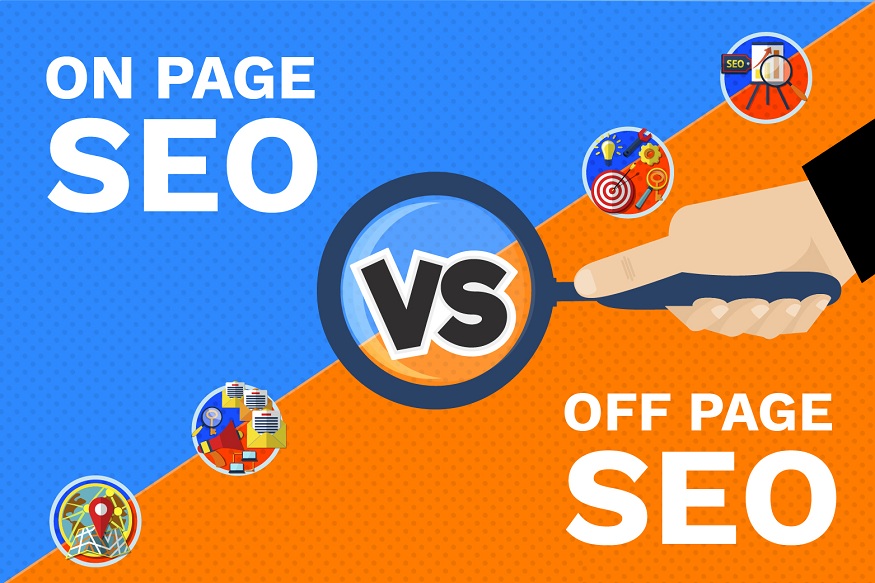Search Engine Optimization (SEO) is often split into two main categories: on-page SEO and off-page SEO. While they operate in distinct ways, both are critical for building a successful online presence. To truly understand how SEO works and why it’s so powerful, it’s essential to grasp the differences between these two pillars and how they complement each other.
Let’s break it down and explore why a balanced approach to both on-page and off-page SEO is essential for achieving top search engine rankings.
What is On-Page SEO?
On-page SEO focuses on optimizing elements within your website to improve search engine rankings and provide a better user experience. Essentially, it’s everything you can directly control on your site.
Key Components of On-Page SEO
- Content Optimization
- Crafting high-quality, relevant, and engaging content that answers users’ queries.
- Incorporating keywords naturally into titles, headers, and body text.
- Meta Tags
- Optimizing meta titles and descriptions to improve click-through rates (CTR) and help search engines understand your page’s focus.
- URL Structure
- Use clean, descriptive URLs that include keywords (e.g., example.com/on-page-seo-guide).
- Internal Linking
- Linking to other pages on your site to enhance navigation and distribute link equity.
- User Experience (UX)
- Ensuring fast page load times, mobile-friendliness, and intuitive navigation to keep users engaged.
- Image Optimization
- Compressing images and using descriptive alt text for better performance and accessibility.
What is Off-Page SEO?
Off-page SEO refers to actions taken outside your website to improve its authority, relevance, and trustworthiness. These efforts help search engines view your site as valuable and credible, often through external endorsements.
You May Also Read: Is Drive Social Media a Pyramid Scheme?
Key Components of Off-Page SEO
- Backlinks
- Acquiring high-quality, relevant links from other websites. Search engines see these as “votes of confidence” for your site.
- Social Signals
- Engagement on social media platforms can drive traffic and indicate popularity, indirectly impacting your SEO.
- Online Reputation Management
- Building and maintaining a positive online presence through reviews, testimonials, and brand mentions.
- Guest Blogging
- Writing articles for reputable sites in your industry, including a link back to your own site.
- Influencer Outreach
- Partnering with influencers to promote your content, increasing its reach and credibility.
The Key Differences Between On-Page and Off-Page SEO
| Aspect | On-Page SEO | Off-Page SEO |
| Focus Area | Within your website | Outside your website |
| Control | Full control (you manage all changes) | Limited control (depends on external sites) |
| Goal | Improve user experience and relevance | Build authority and trustworthiness |
| Examples | Content, keywords, meta tags, UX | Backlinks, social media engagement, reviews |
You May Also Like: How are Organic links different from Sponsored links?
Why Both Matter for SEO Success
Focusing solely on one type of SEO is like exercising only one side of your body—it leads to imbalance. Here’s why both on-page and off-page SEO are crucial:
1. On-Page SEO Attracts Search Engines and Users
On-page optimization ensures your website is easily crawlable by search engines and provides value to visitors. Without solid on-page SEO, your site may struggle to rank, no matter how many backlinks you acquire.
2. Off-Page SEO Builds Credibility
Even with perfectly optimized on-page elements, search engines rely on external signals to gauge your site’s authority. Off-page SEO boosts your reputation and demonstrates to search engines that your content is worth ranking.
3. Together, They Create a Strong SEO Strategy
- On-Page SEO lays the foundation with relevant content and seamless usability.
- Off-Page SEO amplifies your reach and positions your website as a trusted resource in your niche.
A Practical Example
Imagine you own a bakery.
- On-Page SEO: You create a blog post titled “10 Tips for Baking the Perfect Chocolate Cake” with detailed instructions, keyword-rich headings, and optimized images.
- Off-Page SEO: A popular food blogger links to your post, a local newspaper features your bakery in an article, and customers leave glowing reviews on Google.
Together, these strategies drive more traffic, improve rankings, and attract loyal customers.
Conclusion
On-page and off-page SEO are two sides of the same coin. While on-page optimization ensures your website is relevant, user-friendly, and valuable, off-page efforts build the authority and trust needed to outperform competitors.
For a successful SEO strategy, focus on striking a balance between these two approaches. After all, the ultimate goal is to create a website that users and search engines love! For more information on SEO blogs you must check this website – rsdigitalservices.com.

